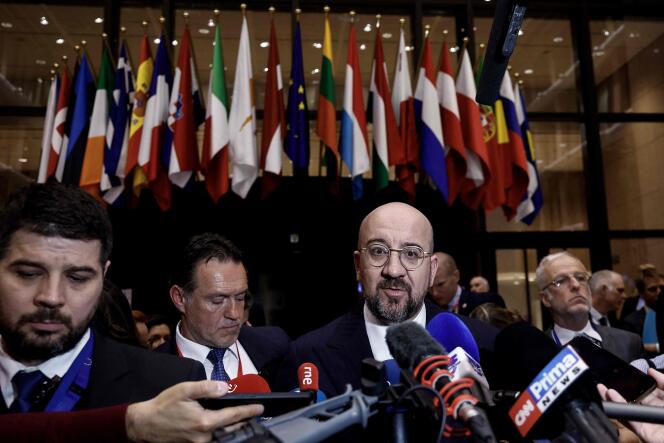


After Iran's massive attack on Israel on April 12, "we have decided to put in place sanctions against Iran, it is a clear signal that we wanted to send," said Charles Michel, the president of the European Council, on Wednesday, April 17. The European Union will sanction, in particular, the producers of drones and missiles in the Islamic Republic. However, after more than four hours of discussions, this was the only concrete decision that the heads of state and government ultimately made.
The 27 member states also called on "Iran and its proxies to cease all attacks" and urged "all parties to exercise the utmost restraint and to refrain from any action that may increase tensions in the region" – this last remark was also directed at Israel. German Chancellor Olaf Scholz emphasized: "For us, it is important that this moment is now also used for further de-escalation and that Israel also uses this success to strengthen its position (...) and does not respond with a massive attack of its own."
Regarding retaliatory measures, "our duty is to expand them," said French President Emmanuel Macron before arriving at the summit. "We are in favor of sanctions that can also target all those who are helping to produce the missiles and drones that were used in the attacks last Saturday and Sunday."
"The idea is to expand the existing Iran-Russia related drone [sanctions'] regime" while also restricting the supply of missiles, stated Josep Borrell, the EU's foreign policy chief, as early as Tuesday. The diplomat added that this sanctions regime should apply to deliveries from Iran's allies "from the Lebanon border, in Yemen, in Iraq, in Syria or wherever." These restrictive measures remain largely symbolic, as Tehran has so far managed to evade them effectively.
Some countries, including the Netherlands, Sweden and Austria, are also pushing to sanction the Iranian Revolutionary Guard Corps. Austrian Chancellor Karl Nehammer asserted that all means to strengthen sanctions should be considered. Scholz underlined that there are already sanction lists for these forces and that additional measures targeting the Revolutionary Guards require legal checks. On Tuesday, Borrell told Le Monde that the legal conditions were still not met.
This strengthening of sanctions was also called for late on Wednesday afternoon by the G7 foreign ministers, as they met in Capri, Italy. At the meeting, British Foreign Secretary David Cameron called on the seven states – Canada, France, Germany, Italy, Japan, the United Kingdom and the United States – to impose "coordinated sanctions" on Iran. Cameron accused it of being behind "malign" activities in a region already destabilized by the unprecedented attack by Palestinian Hamas on Israel on October 7, 2023.
You have 41.48% of this article left to read. The rest is for subscribers only.
